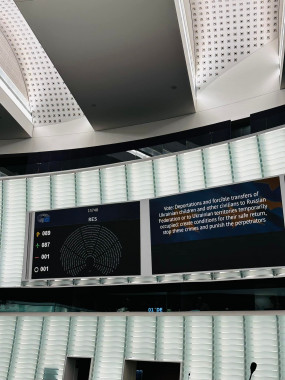
PACE recognizes forcible transfers of Ukrainian children to Russia as genocide
The Parliamentary Assembly of the Council of Europe has adopted a resolution on the forced deportation of Ukrainian children and adults in Russia
The resolution was adopted at the spring session of PACE.
The resolution “Deportations and forcible transfers of Ukrainian children and other civilians to Russian Federation or to Ukrainian territories temporarily occupied: create conditions for their safe return, stop these crimes and punish the perpetrators” was adopted during the debates at the PACE spring session.
The document was supported by 87 votes.
The resolution states that Russia must immediately and unconditionally cease the illegal forced displacement and deportation of Ukrainian children, stop granting them Russian citizenship, and allow UN and ICRC representatives to visit the already displaced children and ensure their safe return.
The PACE also called on the International Criminal Court to consider criminal prosecution for this crime.
According to a member of the Ukrainian delegation to the Assembly, Oleksii Honcharenko, the resolution is the first time the term 'genocide' has been used in relation to Russia's actions in an official document of this level.
It also states that, according to international law, forced deportation is a sign of genocide, so all cases must be investigated and all those involved must be held accountable.
In turn, a member of the Ukrainian delegation, MP Yevhenia Kravchuk, clarified that the resolution:
- emphasizes that the facts of deportation and forced transfer of Ukrainian children to the Russian Federation fall under the Convention on the Genocide of 1948
- welcomes the decision of the International Criminal Court to issue arrest warrants for Russian dictator Vladimir Putin and Russian Children's Ombudsman Maria Lvova-Belova
- supports the need to document, collect and evaluate evidence of the crime of genocide
- calls on the International Criminal Court to consider prosecuting those responsible for the crime of genocide; calls on participating States to consider prosecuting all crimes in national courts
- calls for immediate measures to stop the deportation of Ukrainian children
The document also expands the range of countries where Putin is officially considered a war crimes suspect.
“And this is one of the most important decisions of PACE in this resolution. Not all PACE members are countries that have ratified the Rome Statute (the statute under which Putin's arrest warrant was issued). And it is the adoption of this resolution that expands the range of countries where Putin is officially considered a suspect in war crimes,” Honcharenko added.

-
On March 17, the International Criminal Court in The Hague issued an arrest warrant for Russian President Vladimir Putin and Russian Children's Commissioner Maria Lvova-Belova.
- News














































